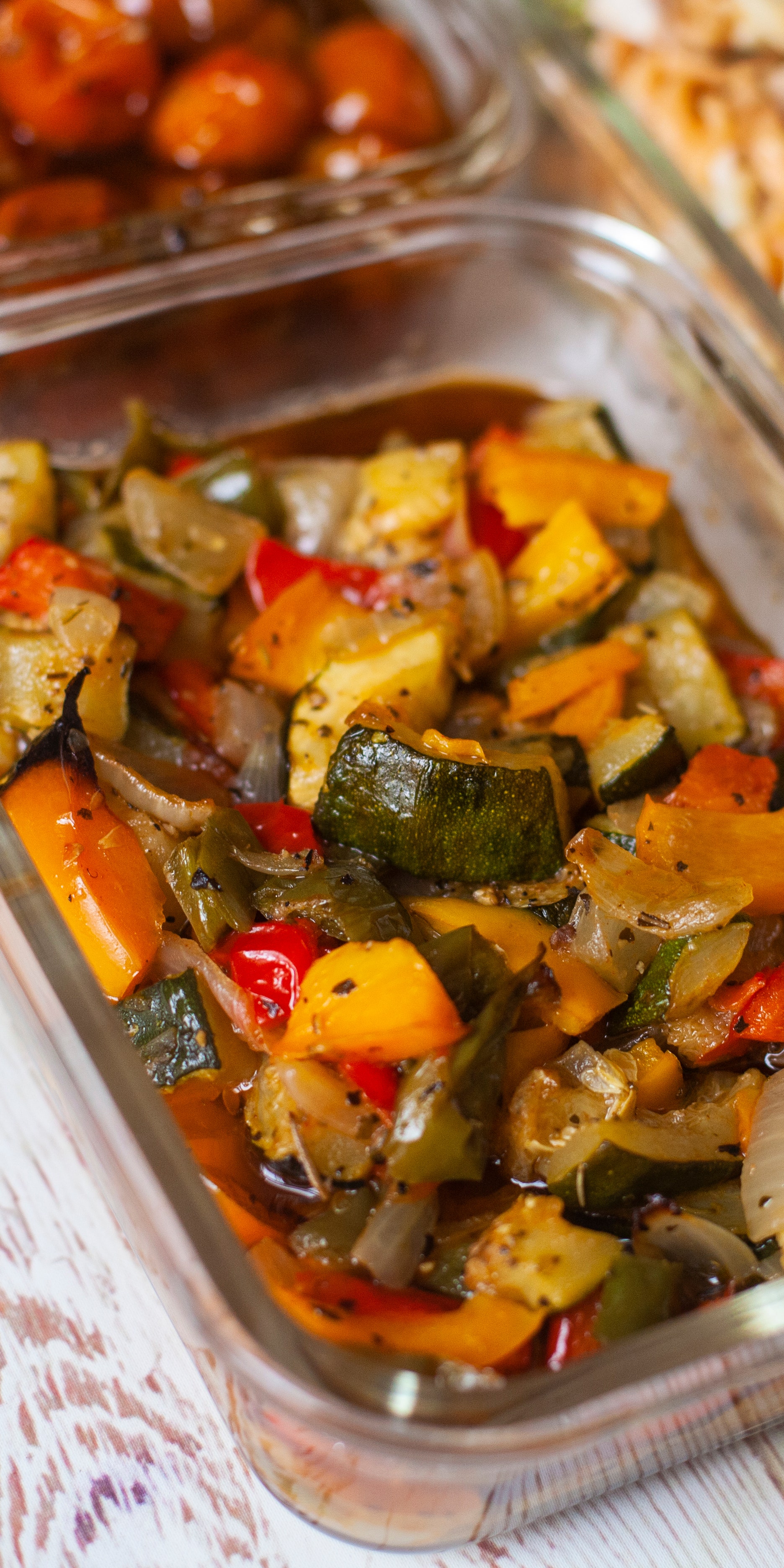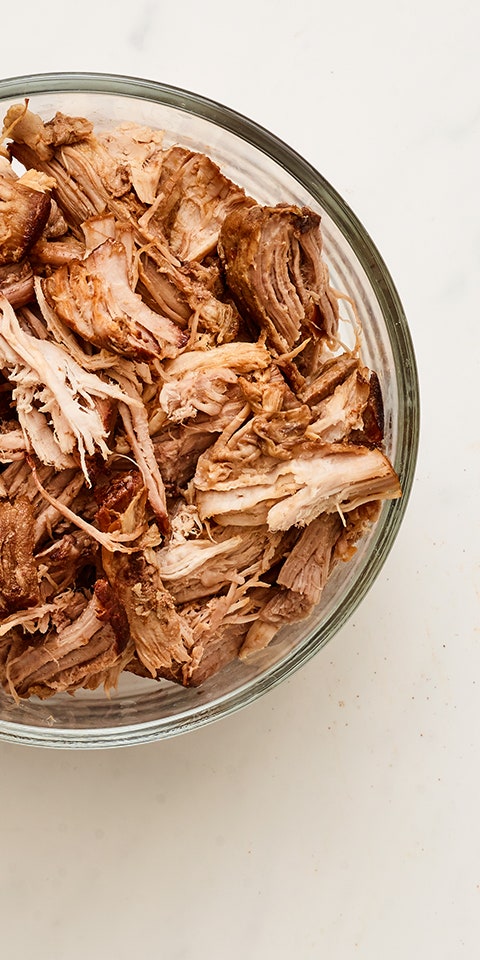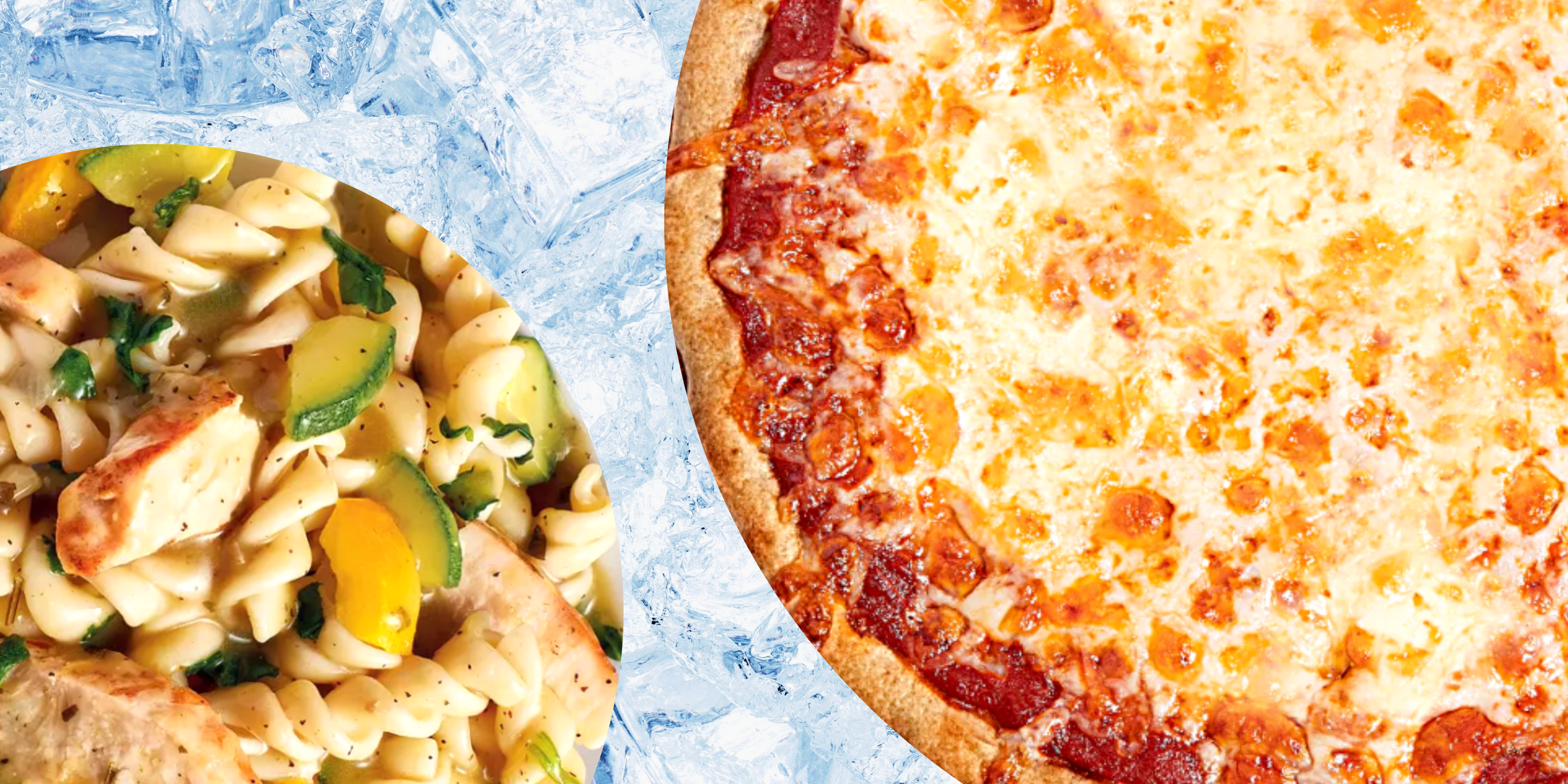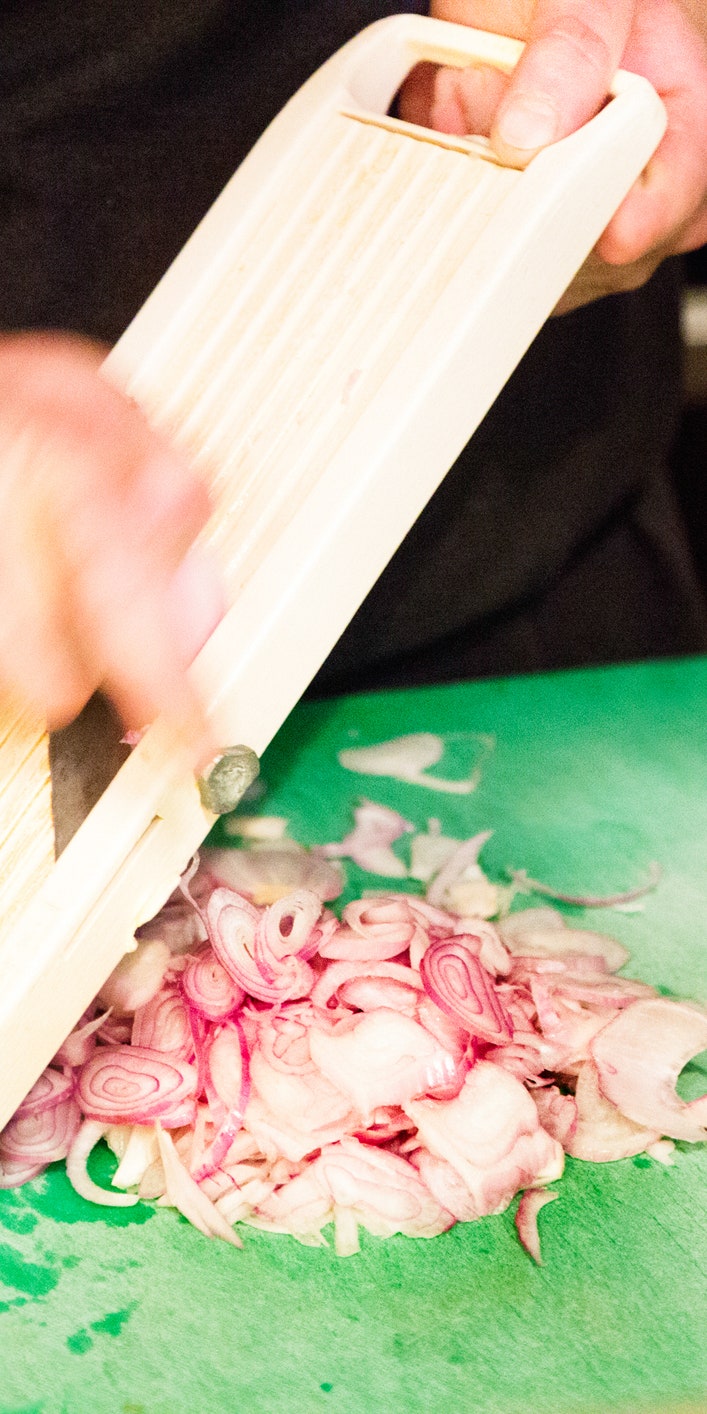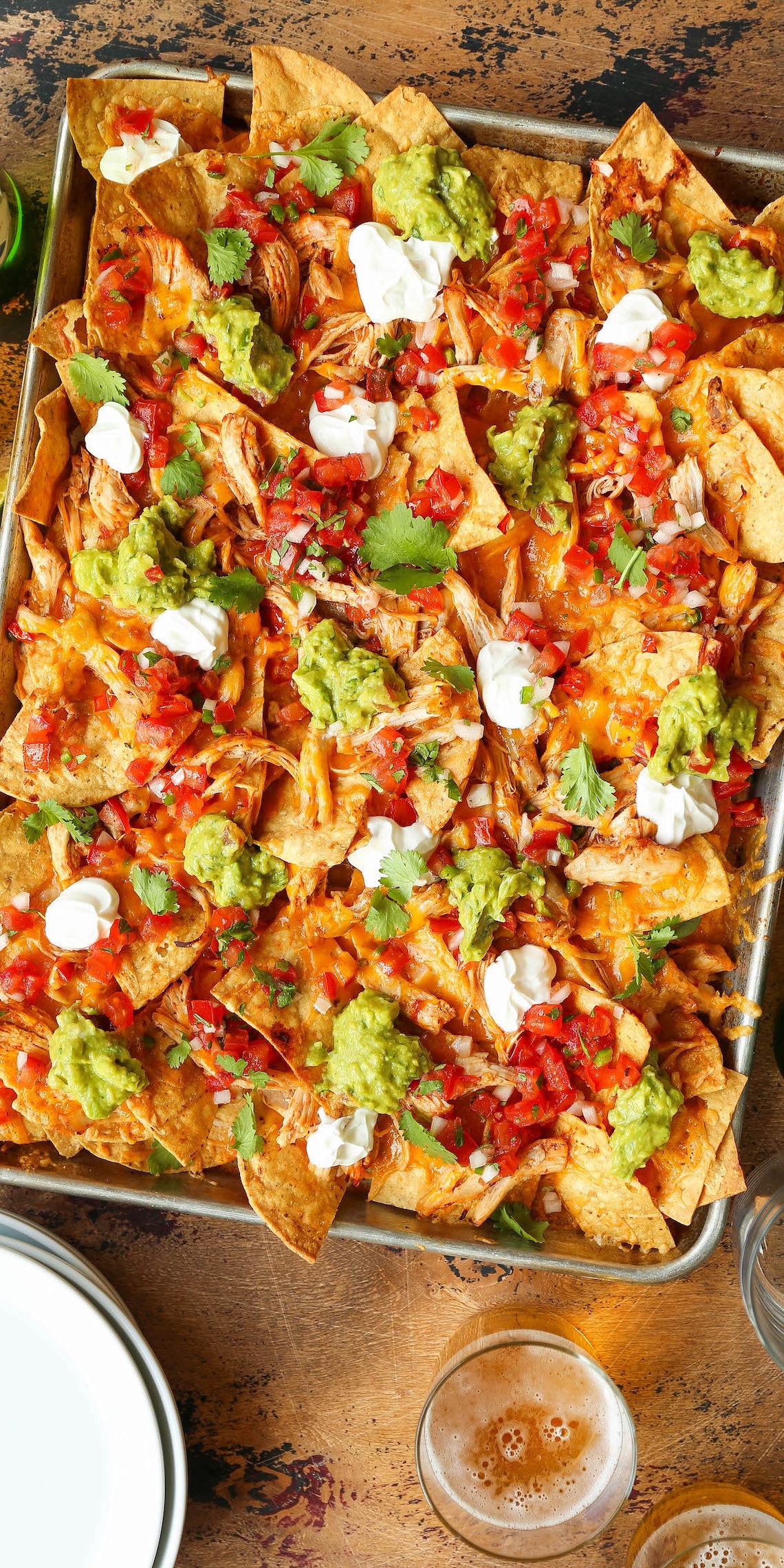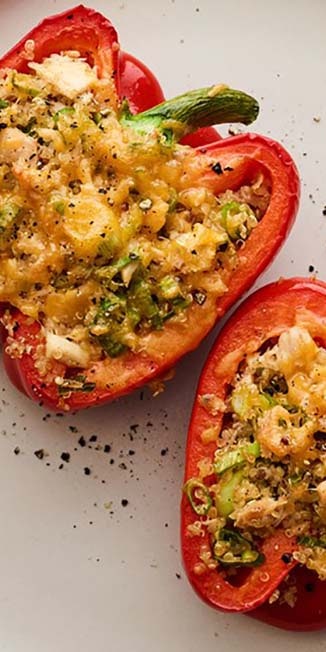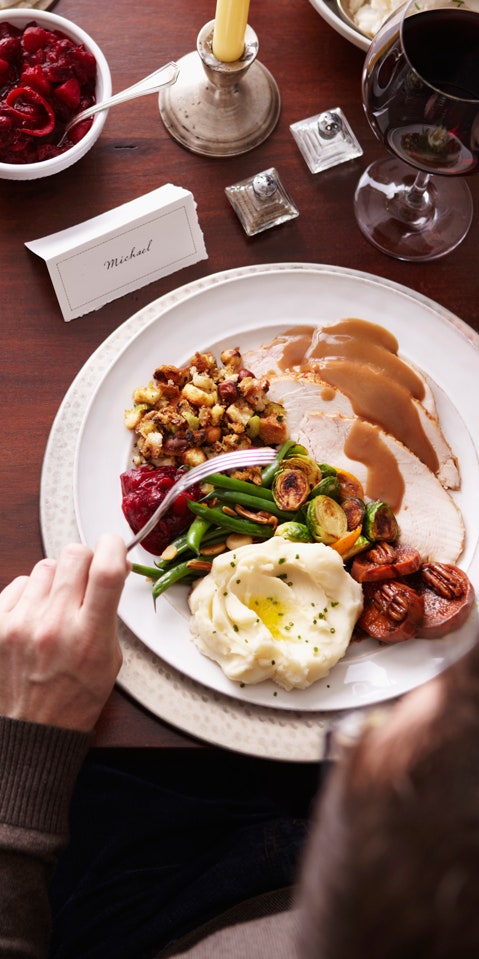13 People on the Meaningful Food Traditions Passed Down in Their Families
Food traditions are often a huge part of get-togethers with family—whether it’s for the holidays or just for the random Sunday dinner. Many of us missing out on these regular gatherings over the past year due to the COVID-19 pandemic showed just how important those in-person connections—especially over delicious food—really can be.
That’s because food traditions, and the act of gathering to prepare the meal and eat it together, provide us with more than just sustenance.
“The process of preparing the food and then sharing in the actual experience of eating the food together strengthens relational ties,” Kelly Haws, Ph.D., a consumer psychologist focused on food decision-making at Vanderbilt University, tells SELF. “In general, we value things more when we create them ourselves. When we add the nostalgia of family traditions and the satisfaction of our basic needs for nourishment, ‘making bread together’ can be particularly rewarding.”
Food traditions within families ultimately tie us together, connecting us both to one another and to our past, Dr. Haws says. “They’re often associated with passing along part of our heritage, the special or ‘secret’ recipes of our ancestors,” she explains. “This evokes powerful feelings of nostalgia, reinforces our common bonds, and brings us closer to one another.”
These food traditions often happen regularly, whether it’s year after year to mark a certain event—say, a special appetizer served for New Year’s—or after a specific situation, like a dish made to celebrate the birth of a baby. Whatever the specifics, food traditions can become something you can rely on.
“Our bodies and minds love routine and consistency,” Susan Albers-Bowling, Psy.D., a psychologist at the Cleveland Clinic, tells SELF. “This makes food traditions so appealing. Not only can you look forward to it, but also there is great comfort in knowing what is coming.”
Just the aroma of these favorite dishes can trigger some feel-good emotions, too, since even subtle smells can evoke an intense response from parts of the brain that house memories, Dr. Albers-Bowling says. As a result, celebrating these food traditions can bring about special memories of family members or family events.
Knowing how meaningful food traditions can be, and how wonderfully varied based on the family, we reached out to 13 people to hear about the special meals their families turn to time and time again. Here are plenty of food traditions that fit the bill, spanning generations and helping each person connect with their loved ones.
1. Matzo ball soup for Jewish holidays…
“For every Jewish holiday growing up, my grandma would always make matzo balls from scratch for matzo ball soup. If you’ve never made them from scratch before, it’s a process. My cousins and I would all go to her house to make them with her. It took all day, and we’d leave smelling like matzo balls, but we always ended up with the most delicious result. My cousins and I always had so much fun going to my grandma’s house. Maybe it’s just the nostalgia, but to this day, I haven’t had any better tasting matzo ball soup.
And making matzo ball soup with her is a memory we still talk about—whenever we make it on our own now, we text each other about it and think of her. We joke about matzo ball soup made from the box mix too. It’s just not the same! Because this memory is so special to me, it’s one I hope to continue with my daughter. She’s only two months old, and I already can’t wait for her to form her own memories making matzo ball soup with my mom.” —Sammi Haber Brondo, M.S., R.D.
2. Or just for those under-the-weather days
“Matzo ball soup as a starter or appetizer before Rosh Hashanah and Passover meals is a meaningful food tradition that has been passed down in my family. Interestingly, matzo ball soup as an appetizer for the big holiday meals even has bled into becoming a staple in times of illness in our family. From a cold, to a flu, to, say, a difficult first-trimester pregnancy (for me), matzo ball soup has been nourishing and traditional.
Now that we have a small baby, he’ll be partaking in the tradition of matzo ball soup (except that he is unfortunately allergic to egg, so we’ll use a substitute). Judaism is all about upholding traditions, and the edible ones make it all the more fun. There’s something about matzo ball soup that is comforting, soothing, festive, safe, and brings a sense of security.” —Monica Auslander Moreno, M.S., R.D.N.
3. A special date-filled dumpling
“My family food tradition is having noodles and dumplings on the menu for Lunar New Year. (Both sides of my family came from northern and southern China.) Noodles symbolize longevity, and the longer the noodles the better. Dumplings symbolize wealth, and are a lucky symbol in Chinese culture. My mother’s mom, my grandmother, would make dumplings from scratch—they’re filled with loads of shredded sweet cabbage and very finely minced meat. Some are filled with chopped shrimp. The texture of the dough is light, airy, yet chewy. Every single bite is full of flavor and deliciousness.
But the most fun part is that from hundreds of dumplings she made, there was only one that had a small, pitted date inside. Whoever got that special dumpling would receive a big red envelope from her (the biggest cash prize from Grandma). This became a family tradition for every Lunar New Year celebration, and that memory stays with me forever.” —ChihYu Smith
4. Dumpling preparation as a team
“Every year, my family makes boiled dumplings from scratch for Chinese New Year’s Eve. Everyone works together to make the dough, roll out the dumpling wrappers, and fill them one by one. We usually make a hundred dumplings or more, and it takes hours. During that time, everyone is chatting and catching up, with the TV on, showing Chinese New Year programming.
The dumplings are cooked in small batches once they’re wrapped, so they remain juicy and fresh. My grandparents and the kids always got the first batch, then the rest of the family takes turns to enjoy freshly boiled dumplings. And of course, everyone would get a second or third round, washed down with cold beer. It’s a special event that happens once per year, when everyone travels from all over the country to sit together. It’s always a memorable moment because I see some of my relatives and cousins during that time only. It makes me feel at home and gives me the warmth of good time spent with family.” —Maggie Zhu
5. A Persian stew to start, an Austrian dessert to finish
“I grew up in a multicultural and multilingual home. My father is from Iran and my mother from Austria, so growing up I was exposed to both Persian and Austrian cuisines. Whenever we were celebrating a birthday or holiday, my mom would whip up a big pot of ghormeh sabzi, which is a Persian stew containing meat, beans, greens, and lots of herbs served with basmati rice and tahdig, which is a layer of pan-fried crunchy rice. For dessert, we grew up eating palatschinken, or Austrian-style crepes, and Persian cookies made of ground chickpea flour, pistachios, and rose water. Now when I make dessert, I like to make a Sacher torte, which is a traditional Austrian dessert, a chocolate layer cake filled with apricot jam and topped with a dark chocolate icing.
Most Popular
- 5 Less Obvious Signs of Seasonal Depression You Should Definitely Pay Attention To
By Maggie O’Neill
- 42 Creative Valentine’s Day Gifts for Guys
By Sarah Madaus
- Just Some Fun Sex Toys You and Your Partner Will Love
By Gabrielle Kassel
Although I am no longer living in close proximity to my family, I am still able to practice all of these food traditions. Food traditions allow you to travel through your plate and allow your taste buds to reconnect to a place you’ve visited before or dreamed about visiting. Through cooking traditional Austrian dishes and pastries, I can still enjoy and embrace the Austrian cuisine and be transported back to my childhood summers spent in Austria. ” —Roxana Ehsani, M.S., R.D.
6. Buttery goat broth after giving birth
“When I gave birth to my son back in 2018, my mom brought a steaming bowl of meaty goat broth to the hospital. She also added some freshly whipped butter to the broth, which I devoured within seconds. Apparently, it was a family tradition to serve this dish to the new mom for several days after giving birth in order to try to promote healing and proper nutrition.
After becoming a mother myself, I completely understand how vital it is for a new mom to have access to healthy, wholesome foods right after going through childbirth. They say you should expect the first thing you taste after giving birth to be incredibly delicious, but looking back, my tastebuds were still not prepared for what my mom had in store for me. Whenever I have a bite of that meaty broth, I’m instantly back in that hospital room, rejoicing at the birth of my dear baby boy, with my belly full of my momma’s love-filled cooking.” —Alisha Khan
7. A combo of good-luck foods for the New Year
“One of the most uniquely Japanese foods passed down not just in my family, but for many Japanese families, is the New Year food called osechi ryori (osechi). It’s made up of many traditional dishes, such as candied chestnuts and sweet potatoes, rolled egg, candied sardines, fish cake, ozoni (a Japanese soup containing mochi rice cakes), and black soybeans. Each dish has a specific meaning for bringing good luck in the new year, which is the most important holiday in Japan as families gather together.
Traditionally in Japan and even today, many shops are closed [for a certain amount of time]. Families make osechi and eat it over this period. Even though I live in the U.S., I look forward to celebrating every New Year with these traditional foods and customs. I have the fondest memories of my family gathering together, enjoying great food, and celebrating the coming of a new year, so I want to pass this on to my children. Hopefully, they too will carry the tradition when they have a family of their own. There is an indescribable joy, peace, and reconnection when I make osechi and celebrate New Year’s with my family. It transports me back to Japan immediately!” —Namiko Chen
8. A bowl of black-eyed peas for prosperity
“A food tradition I love is cooking a big batch of black-eyed peas on New Year’s Day. Like for most African American families, eating a bowl of black-eyed peas to bring in the new year symbolizes prosperity and protection in the year ahead. Regardless of what other dishes are on the menu, black-eyed peas are nonnegotiable. It allows me to feel connected to my family even when we’re apart due to distance.
Most Popular
- 5 Less Obvious Signs of Seasonal Depression You Should Definitely Pay Attention To
By Maggie O’Neill
- 42 Creative Valentine’s Day Gifts for Guys
By Sarah Madaus
- Just Some Fun Sex Toys You and Your Partner Will Love
By Gabrielle Kassel
The black-eyed peas have been a constant since childhood, and now that I’m an adult living on my own, away from family, this tradition allows me to feel a sense of connectedness because we are all cooking the same dish on the same day of the year. After transitioning to a plant-based lifestyle in 2013, I’ve developed a recipe that honors the way my mother and grandmother made black-eyed peas without using any animal products—traditionally, it’s made with ham— and that’s something I’m proud of. I plan to continue this tradition because I want my children to develop their own relationship with the dish and what it symbolizes.
When I think about this tradition, I feel a sense of pride and gratitude. Pride because I’m proud to carry this tradition to the next generation, and gratitude because I’m grateful for the women in my family who instilled a passion for cooking by upholding these traditions connected to food and fellowship.” —Breanna Danielle Brock
9. An ever-evolving sour cream pound cake
“For my family, it is truly the art of baking. My grandmother was an avid baker and passed down several incredible cake recipes. One of the best is a sour cream pound cake, which would come out on big holidays and during regular Sunday suppers with the family. It was a classic vanilla style bundt cake that was super moist, delicious, and perfect on its own or with icing or powdered sugar on top. It was a wonderful ritual. We made it all types of ways, always changing the flavors and adding new ingredients to play around with it.
Now that I have a two-year-old daughter of my own, I get her involved in the kitchen with my mom and me to bake cakes. It feels good, and it feels part of my heritage. I love being able to honor my ancestors in that way, and it also makes me feel very close to my grandmother even though she isn’t here anymore. Baking cakes definitely brings happiness and excitement. I love watching my daughter explore all of those emotions now as she learns exactly what it takes to bake with love.” —Jocelyn Delk Adams
10. Maple syrup at the first sign of spring
“A favorite family food tradition is making homemade maple syrup. My grandpa made it with his brothers when he was a kid. Today, my brother and I each carry on the tradition with our own families. We love maple syrup days.
As spring approaches and the days start to become warmer yet the nights still drop below freezing, the sap starts to run. This is our sign to take our taps and set them in the freshly drilled holes in our maple trees. It’s not a fast process, but it is a satisfying process. We walk to each tree, collect the sap in large buckets, pour it into a large pan that is set over an open fire, and watch the sap boil down to syrup. We hang out with family and friends, cook food, and enjoy being outside in the springtime sun. The whole family chips in.
Most Popular
- 5 Less Obvious Signs of Seasonal Depression You Should Definitely Pay Attention To
By Maggie O’Neill
- 42 Creative Valentine’s Day Gifts for Guys
By Sarah Madaus
- Just Some Fun Sex Toys You and Your Partner Will Love
By Gabrielle Kassel
I keep making syrup every year because I love it. Also because my grandpa did it. He is one of my best friends, and we do all sorts of outdoor adventures together. We tend to be so disconnected from our food sources nowadays, so it’s important to me for my two kids to get outside with us and tap the trees, collect the sap, and spend a couple of days boiling it down to syrup.” —Laura Mason
11. A bowl of arroz con gandules for the good times
“There are tons of variations of gandules in my Dominican household—it’s rice with gandules (pigeon peas) and olives that is mixed with lots of spices like sazon, adobo, cilantro, and much more. The amazing thing about this dish is that every family has their own style and flavor. My mom’s rice is different from her sisters’. And I appreciate those little changes and specialties that make it so important.
We use it to celebrate just about everything, so I associate it with family and sharing happy moments. It’s literally the first food my husband ate when he met my mom. Not only is it delicious, but especially with this year where we haven’t had much connection with our loved ones, it helps me still stay connected to who I am and to my family. It’s not just food, it’s an identity. This rice is such a warm hug, and makes me feel light and happy.” —Catherine Perez, M.S., R.D., L.D.N.
12. Soups for Christmas
“Each year, my family would come together for Christmas and indulge in our favorite soup dish while reflecting on the year and creating new memories. During the holiday season in Ghana, we would create special meals or snacks and share them with our neighbors and family friends. It was time to celebrate.
Our go-to special meal since we’ve lived in the States has been soup, and we switch it up every year. From groundnut soup (a soup made from peanuts that uses a variety of ingredients including tomatoes, seasonings, spices, and meat) paired with rice balls to a soup that’s light or made with palm nuts, our food tradition brings us comfort and joy and keeps us connected. I always look forward to spending time with family while connecting over our favorite food. It’s the best time, really. I can’t always travel to Ghana, but our food tradition makes me feel like I am right where I need to be, at home. It makes me feel pure joy, warmth, and love.” —Valerie Agyeman, R.D.
13. Baking and mailing Christmas cookies
“Food is our love language in our household, and one of my favorite examples of this has been baking cookies during Christmas and mailing them to our loved ones. As a child, I looked forward to this tradition the most during my winter break. My mother would make chocolate chip, peanut butter, and sugar cookies. After hours of baking cookies and sneaking some cookie dough in between, we would then place them into holiday tins and mail them off to grandparents, aunts, uncles, and cousins.
During the pandemic, this tradition reminds me of how food connects us all and serves as a vehicle for memories. It makes me feel nostalgia, happiness, joy, and gratitude. Now each year, I plan to either mail or deliver cookies to my friends and family during the holidays. And I also look forward to the day I will be in the kitchen with my child sharing this tradition, to show them a simple way of showing love, appreciation, and the importance of creating traditions.” —Dominek Tubbs
Quotes have been edited and condensed for clarity.

